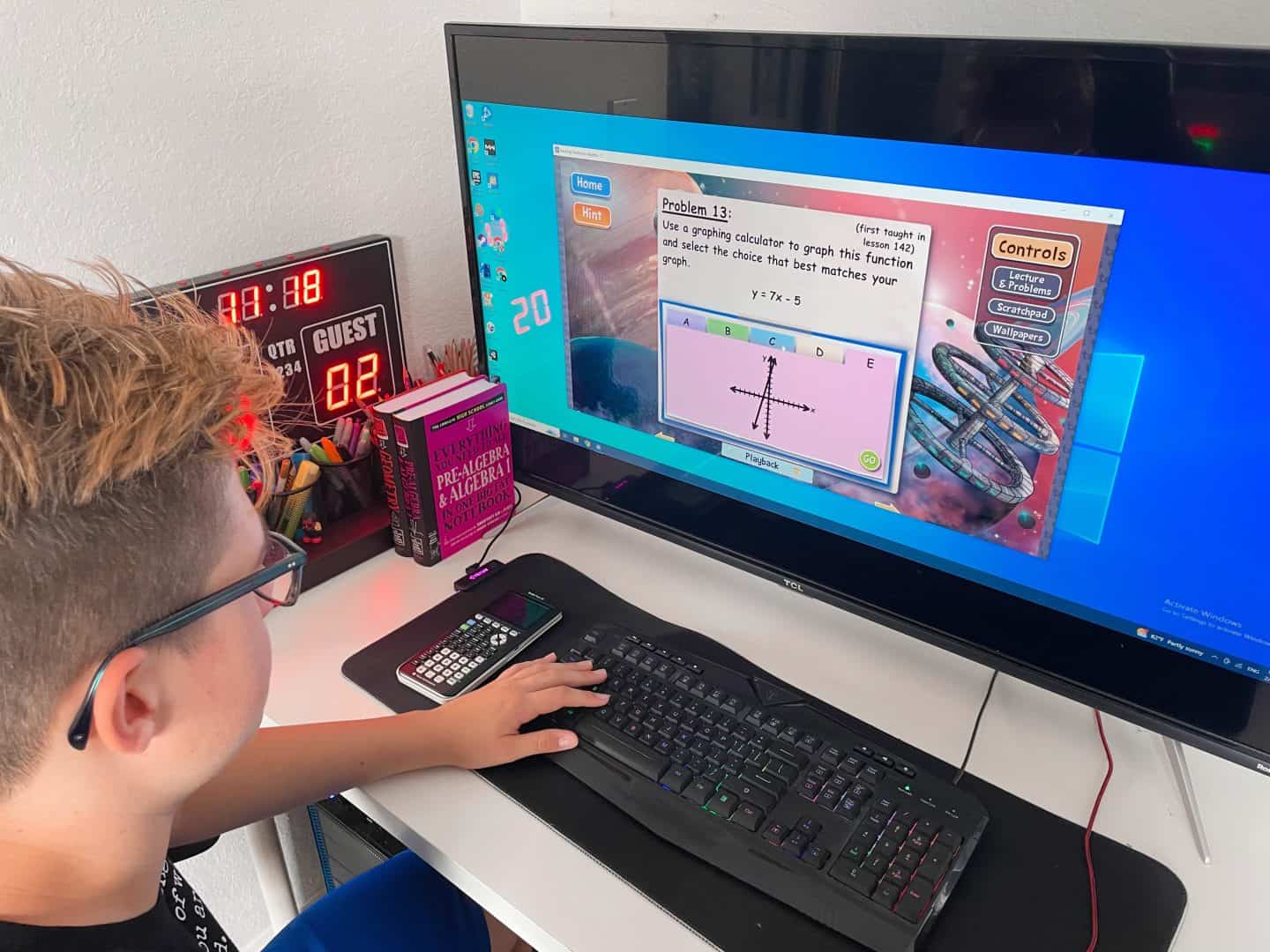The Real Cost of Homeschooling | What You Need To Know
Thinking about switching to home-schooling? Let’s break down the cost of homeschooling and see if it’s the right move for your family.
Home-education comes with many benefits, but it’s essential to understand the financial commitment involved. From homeschooling resources to extracurricular activities, the costs can add up.
However, with the right planning, homeschooling can be a financially viable option compared to private-school tuition and public-school expenses.

**This post may contain affiliate links. As an Amazon Associate and a participant in other affiliate programs, I earn a commission on qualifying purchases.**
Initial costs and startup expenses
Curriculum and resources
The homeschooling curriculum is a significant upfront cost. Depending on the type and comprehensiveness, prices can range from $300 to $1,500 per child per year.
Whether you are looking for Christian homeschool programs, such as Sonlight, or a secular homeschool curriculum such as Pandia Press, understanding the cost of homeschooling and the resources required is crucial to making an informed choice for your family’s educational needs.
Some families create their own curriculum, which can save money but requires significant time and research.
Pre-packaged curricula from established educational providers ensure comprehensive coverage of subjects and often include lesson plans, which can ease the burden on the parent-educator.
Educational materials and supplies
Expect to spend around $100 to $500 on textbooks, workbooks, and educational materials. Utilizing online courses and free homeschool curriculum resources can help cut down these expenses.
Many homeschooling families swap materials or buy used books to save money. Public libraries are also a valuable resource for free educational materials.
Check out the best homeschool workbooks!
Technology and online tools
A reliable computer and internet connection are essential. Budgeting for these tech necessities can add $200 to $800 initially, plus any monthly internet fees.
For specialized software or online learning programs, factor in an additional $50 to $200 annually.
Free online homeschool programs, virtual classrooms, and educational apps can enhance the learning experience and provide a structured environment for subjects like math, science, and foreign languages.

Recurring annual expenses
Extracurricular activities
Participation in sports, arts, and other extracurricular activities can cost between $100 to $500 annually. Field trips, an essential part of a home school program, might add another $100 to $300 per year.
Homeschooling allows for flexible schedules, enabling families to visit museums, zoos, and historical sites during off-peak hours, often at discounted rates.
But you can enjoy virtual field trips for homeschoolers from the comfort of your living room for free!

Testing and evaluations
Standardized tests and other evaluations required by state laws or chosen for academic tracking typically range from $50 to $200 per test. We have been using Homeschool Boss testing for the last 5 years.
Membership in organizations like the Home School Legal Defense Association (HSLDA) can also help with guidance and compliance, costing about $130 annually.
Regular assessments can help ensure that students meet grade-level expectations and prepare them for college admissions.
Homeschool groups and co-ops
Joining a homeschool support group or co-op for socialization and group learning experiences might cost $50 to $300 per year.
These groups often share resources and provide valuable community support.
Co-ops can offer classes taught by other parents, providing expertise in subjects where a parent may feel less confident.
Additional Considerations
Parental involvement
Homeschooling requires significant parental involvement, which might mean one parent reduces work hours or quits their job.
This opportunity cost should be factored into the financial planning for home education. However, many parents find the investment of time worthwhile for the flexibility and personalized education it allows their children.

Specialized education needs
For students with special needs, additional costs for specialized tutoring or therapy can range from $50 to $150 per hour. Some state programs offer assistance, so it’s worth exploring available resources.
Customized learning plans can cater to the unique requirements of gifted children or those with learning disabilities, ensuring they receive the attention and support they need.
Tips for homeschooling a child with ADHD
College and career prep
Homeschoolers aiming for college may need to budget for AP courses, SAT/ACT prep, and other college admissions requirements. This can add $200 to $1,000 depending on the number of tests and preparation materials.
Homeschooling can also offer the flexibility to start college courses early or pursue internships, giving students a head start on their career paths.
Check out the best homeschool programs for high school!
Comparing costs with public and private schooling
When comparing homeschooling to public schools, public schooling often seems less expensive upfront due to no tuition fees. However, costs for public school can add up through supplies, field trips, extracurricular activities, and the hidden expenses of peer-pressure-related spending.
Public schools may also have fees for special programs, sports, and extracurricular activities.
Private-school tuition ranges from $10,000 to $40,000 annually, making home-schooling a more economical choice for many families.
Private schools often provide a more structured and rigorous academic environment, but homeschooling allows for a tailored education that meets the individual needs of each child.
Socialization and extracurricular activities
A common concern about homeschooling is the potential lack of socialization. However, homeschoolers have ample opportunities to interact with peers through co-ops, sports teams, community activities, and extracurricular classes.
Homeschool groups often organize social events, clubs, and field trips to ensure children develop strong social skills.

Community involvement
Many communities have thriving homeschool networks that offer a variety of activities, from science fairs to theater productions.
These groups provide a sense of community and allow homeschoolers to form lasting friendships.
Sports and physical activities
Homeschoolers can join local sports leagues, dance classes, martial arts, and other physical activities.
Some public schools allow homeschoolers to participate in their sports programs, providing additional opportunities for physical education and teamwork.
Legal requirements and compliance
Homeschooling is legal in all 50 states, but each state has different regulations and requirements. It’s important for parents to familiarize themselves with the laws in their state to ensure compliance.
Notification and record-keeping
Many states require parents to submit a notice of intent to their local department of education.
Find out how to keep records for homeschool.
Some states require periodic assessments or standardized tests to ensure that children are meeting educational standards.
Legal defense and support
Organizations like the HSLDA offer legal support and resources to homeschooling families.
Membership in such organizations provides peace of mind and access to legal assistance if needed.
Financial planning and budgeting
Effective financial planning can make homeschooling more affordable. Here are some tips to manage costs:
Create a budget
Outline all potential expenses, including curriculum, materials, extracurricular activities, and technology. Prioritize spending based on your educational goals and available resources.
Utilize free resources
Take advantage of free online resources, public libraries, and educational websites. Many organizations offer free or low-cost curriculum and materials for homeschooling families.
Additionally, free homeschool printables can be a great supplement to your curriculum.
Shop smart
Buy used textbooks, educational materials, and supplies. Homeschooling conventions and online marketplaces often have significant discounts on curriculum packages and educational tools.
Plan for extracurricular activities
Allocate funds for extracurricular activities and field trips. Look for community programs, clubs, and classes that offer affordable or free participation.
Long-term benefits and considerations
While the initial costs of homeschooling may seem daunting, the long-term benefits can outweigh the financial investment.
Homeschooling allows for a customized education that caters to a child’s learning style and pace, potentially leading to higher academic achievement and personal satisfaction.
Individualized education
Homeschooling provides the flexibility to tailor the curriculum to a child’s strengths, interests, and needs. This individualized approach can foster a love of learning and help children reach their full potential.
Family bonding
Spending more time together can strengthen family bonds. Homeschooling allows parents to be actively involved in their child’s education and development, creating a supportive and nurturing learning environment.
Flexibility and freedom
Homeschooling offers the freedom to explore diverse subjects, travel, and engage in hands-on learning experiences.
Families can set their own schedules, allowing for a balanced approach to education and personal interests.
What are your reasons to homeschool? Let me know in the comments below.
Last Updated on 21 October 2025 by Clare Brown










I am thinking about home schooling. My 13 year old son has recently been diagnosed with ASD Autism Spectrum Disorder. Would I be able to home school or would this go against me?
I don’t know what you mean, go against me? Having ASD would not stop you from homeschooling, however, there may be provisions in place that might change that. It will be best to speak to your local home education department to confirm either way. But good luck :))
Is there a certain amount of time a day you are required to ‘teach’ them? Could I do it alongside my job (8.30-3.30) so after work and weekends?
My son will be going to secondary in sept but really aren’t sure about it x
Hey, that is one of the awesome things about homeschooling. As long as the hours are covered, you can do them when you like. Weekends, at night, during the summer break.
Hello Clare,
I just pumped to your web and looks like you know lots of home schooling. Please advise me what shall I do first … means first step to sign my kids to home schooling educations. Shall I contact with council or school first? And all other info will be nice to know. My older is 13y and younger 9y
Best
Aga
Hey Aga
I think it depends where you live. If you are in the UK or Wales you don’t officially need to tell the school at all. However, we did. You just need to contact your local home education department and inform them of your decision to home educate.
Any other questions please ask.
My daughter is 12 years old and I really would like to know more about homeschooling at this age range. Thanks in advance.
Did you get any info? My son is 12 and not having a good time at school. Ive offered homeschooling as an option to look into. He seems keen but i also want to find out more for secondary age.
Hi Jennifer, my son is 11, 12 in December, feel free to message and I am happy to chat with you about it. Its [email protected]
Hi I am so sorry I missed this comment Patricia, did you decide to homeschool your daughter in the end?
hey when this coronavirus mess up has ended I want to homeschool my daughter but I read something saying to homeschool your child you have to pay 13k a year for the schooling not the supplies or clothes but this says it’s free and another one said £300-600
Hey I am sorry I missed your message, did you decide to homeschool in the end? Homeschooling can absolutely be free, feel free to message me 🙂
Wow, only £1.75 for school lunches, we pay £2.30 each day for ours (although had the 1st 3 years free). If you’re at home, you still need to provide lunch, and wouldn’t you pay for transport/membership to home school groups/events etc if you do those? But you don’t have morning club or after school clubs/wrap round care which working parents have to pay for. Our school trips are cheap – probably only pay about £30 a year for all the cross school events and the 1 or 2 cheap trips a year in total. We don’t do big trips at our school until y5/6 when they have a residential. We do have the cost of swimming bus (about £35 a year), but his swimming has come on so much going twice a week.He certainly wouldn’t get to swim as much relying on me to take him regular.y
Tbh, I’d much rather pay the money, have a child who’s educated (I hope) at a decent level across all the subjects better than I could probably do, with his peers, as well as getting the breadth of sport opportunities that he has to do (but would refuse out of school to try). Plus I wouldn’t lose my annual salary. Even if I wanted to home school, it wouldn’t be an option as I work full time and wouldn’t be willing to give up work to teach. I doubt as you said, that cost comes into the equation with people deciding to home school
You are definitely right about the loss of income of course, which I haven’t taken into account here as I work from home. So yes of course home education isn’t for everybody (to be honest I hadn’t even considered it until about 6 months ago). Freddie had his first school residential in year 2 (I hated every minute of it!!! – But he of course loved it!!) so I think it massively depends on each school.
The reason I actually wrote the post was because I honestly thought it would be costing me more, as I have heard many times before from home educators. But for us personally it is actually saving me money (which I will be saving for him to go to university).
I haven’t got a problem with the school system at all, and to be honest I feel that for most children it is for the best. However, for us home education is definitely the way forward 🙂